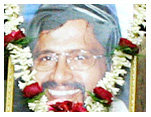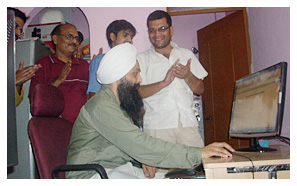 I am presently at Hyderabad undertaking my Mid Career training program. It is proving to be a very good learning and experiencing period where many new facts are emerging before us. I present a few of the more interesting ones here. The first one is about the British police’s method of interrogation.
I am presently at Hyderabad undertaking my Mid Career training program. It is proving to be a very good learning and experiencing period where many new facts are emerging before us. I present a few of the more interesting ones here. The first one is about the British police’s method of interrogation.
Whenever any person is arrested in England today, the first thing the British policemen do is to let them know the reason for their arrest. This is followed by asking them if they have a solicitor of their own or they want a solicitor free of cost. If they ask so, the arrested persons are provided one such solicitor from the empanelled list. They are also asked if they want any other kind of legal advice. If the accused is below the age of 17, immediately they are asked to call their guardian which includes their father and/or mother. If it is a case of murder, the accused is immediately sent for psychiatric examination to ascertain if the person is mentally ill. This serves two purposes- if the person is mentally ill, it provides a reason for his criminal conduct, if not so then it eliminates their right to such defence later on.
When the British police officers talk to the accused, they call it Interview and not “Interrogation”. They find the word interrogation a bit too authoritative and value-loaded. Before the interview, the accused are told about their legal rights about the evidence being used against them and hence their right to silence.
They begin the interview by tape-recording it where a new tape is inserted in the tape-recorder where both the parties sign it. At the time of interview, there are minimum of two police officers, the accused, the solicitor. Two cassettes of the tape are used and when the interview is over, one tape is handed over to the accused.
These officers neither use abuses nor beat the accused. They also don’t humiliate or threaten them nor they use any third degree methods. On the contrary, there are many times when the accused go to the extent of abusing the cops or throwing water on them. There are occasions when the accused even spit on the police officers but they keep cool and go on with their duty.
And despite no abuses, no accusations, no threats, no third-degree the British police is able to register a very high degree of conviction (around 80%).
Another interesting fact is related with who control the Police Force in Britain. One of our trainers here at Hyderabad, Lord Ian Blair (a famous police officer from Britain, its former Metropolitan Commissioner and now a member of the House of Lords) quoted the statement of Lord Denning in the celebrated case of R. v. Metropolitan Police Comr., Ex parte Blackburn, in 1968. It is claimed that this case “has had more influence over the realities of police governance in their country than any legislated mandate ever did.”
The decision relates to the position of the Commissioner of the London Metropolitan Police, who is that force’s chief of police. Lord Denning held:
“I have no hesitation … in holding that, like every constable in the land, [the Commissioner of the London Metropolitan Police] should be, and is, independent of the executive. He is not subject to the orders of the Secretary of State, save that under the Police Act 1964 the Secretary of State can call on him to give a report, or to retire in the interests of efficiency. I hold it to be the duty of the Commissioner of Police, as it is of every chief constable, to enforce the law of the land. He must take steps so to post his men that crimes may be detected; and that honest citizens may go about their affairs in peace. He must decide whether or not suspected persons are to be prosecuted; and, if need be, bring the prosecution or see that it is brought; but in all these things he is not the servant of anyone, save of the law itself. No Minister of the Crown can tell him that he must, or must not, keep observation on this place or that; or that he must, or must not, prosecute this man or that one. Nor can any police authority tell him so. The responsibility for law enforcement lies on him. He is answerable to the law and to the law alone.”
Though one of Lord Dennings’ critics Laurence Lustgarten said in The Governance of Police- “seldom have so many errors of law and logic been compressed into one paragraph” but as per Lord Ian Blair, the situation in Britain today is more explicitly explained by the statement of Lord Denning than that of Laurence Lustgarten.
Finally, something from the Indian side. This is related to an open and invigorating informal discussion among the IPS officers on training in Hyderabad on Police culture in India. Almost all of the officers participating in this discussion were unanimous that Police in India will never get reformed because all culture is too regimented and hierarchy-bound. The participants were recollecting their own experiences in this regards where they had been snubbed, humiliated, quieted and ostracized for having been outspoken and truthful before their senior officers. They went to the extent of saying that despite the fact that Army has more regimented structure than ours, yet their officers have more freedom to express their views. They also said that the Army officers don’t exactly impose everything on their juniors but try to make it as participative as possible.
During this discussion, one comment that I really liked came like this- “Mere Commissioner ka to jawaab hi nahi hai. Jab bhi aap kuch kahna chaahiye to saaf kahte hain ki Dekho bete, badon ke aage bacche nahi bola karte. Bas phir baat hi khatam ho jaati hai.” (My Commissioner is unique in this regards. The moment one starts to put forth one’s point of view, he will squarely say- “Look here young man, one shall not open one’s mouth before elder people, this is disrespectful. With this ends scope for any kind of discussions.”
So, doesn’t it seem that Indian and British system of Policing are quite far away even today.
Amitabh, IPS officer from UP, presently on training at National Police Academy at Hyderabad.















onkarsingh
May 28, 2011 at 6:38 pm
marvellous sir
Kushagra
May 28, 2011 at 8:51 pm
Dear Amitabh jee,
I have one think to ask you but it need your honesty. how will you rate yourself in the parameters of british policing?? I mean would you follow the same, would you be cool an calm while dealing with common people, would you convince your under under fello police to work in same manner ???????
I am asking these question to you because i find you bit honest while blogging. hoping you will respond it.
would you fell powerfull or responsible for being IFS??
कुमार सौवीर, ब्यूरो प्रमुख, महुआ न्यूज, लखनऊ
May 29, 2011 at 3:43 am
And despite no abuses, no accusations, no threats, no third-degree the British police is able to register a very high degree of conviction (around 80%).
और हमारे यहां तो बात की शुरूआत ही मादर-फादर-सिस्टर से होती है। साथ में लाठियों का छौंका भी खूब लगता है। दे दनादन।
पुलिस जिसे भी अदालत में पेश करती है, वह लंगडाकर ही चलने पर मजबूर होता है।
सडक से लेकर थाने तक ठोंकापीटा ना हो तो पुलिस को मजा ही नहीं आता। इसीलिए तो पुलिस को देखते ही महिलाएं और शरीफ लोग थाने पर जाना तो दूर, इस बारे में सोचते तक नहीं।
कुमार सौवीर, लखनऊ